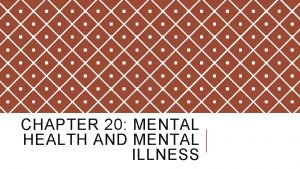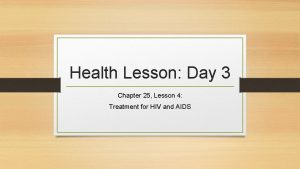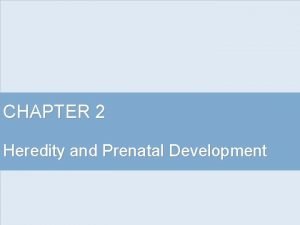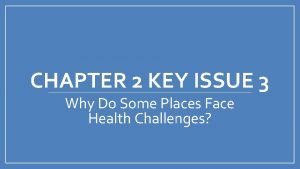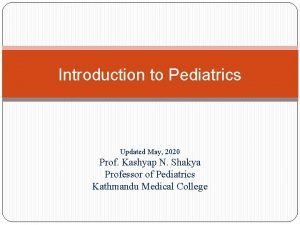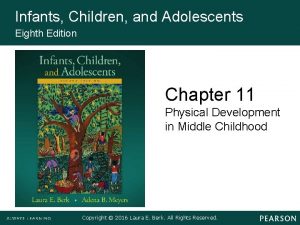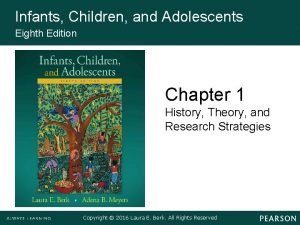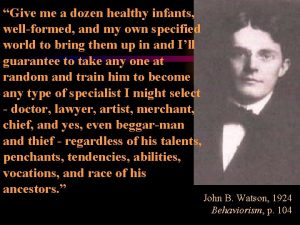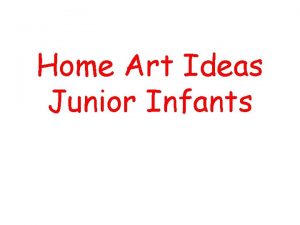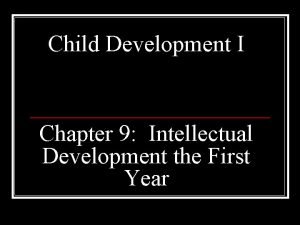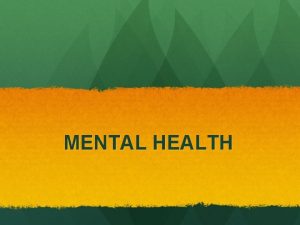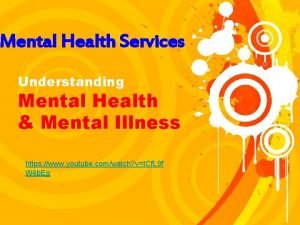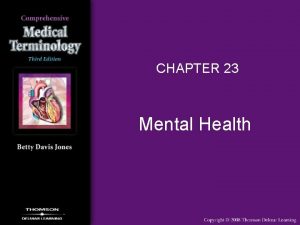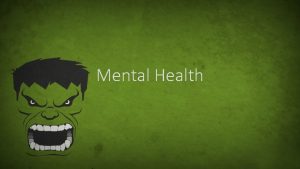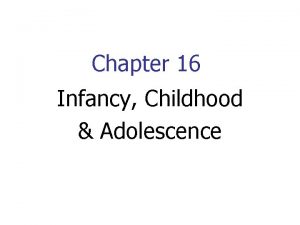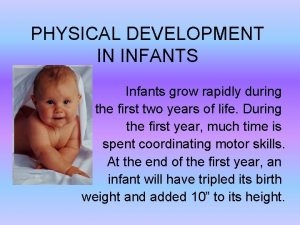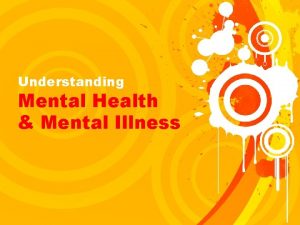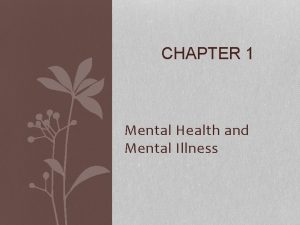When Parents of Infants Have Mental Health Challenges



















- Slides: 19

When Parents of Infants Have Mental Health Challenges HELP ME GROW OHIO DEPARTMENT OF HEALTH JUNE, 2011 JOHN D. KINSEL, MS, LPCC-S GARRISON AND ASSOCIATES

Outline Common Attachment Issues Common Mental Health Issues of Parents Effects of Parental Mental Health Challenges on Child Development Strategies for Help Me Grow Intervention When and Where to Refer

Common Attachment Issues “There is no such thing as a baby. ” Winnicott The quality of the care-giver/infant relationship determines the course of the development of attachment. Attachment is the key organizing process for the emotional development of the very young child.

Common Attachment Issues Secure Attachment • Caregiver: warm, sensitively attuned, consistent, responds quickly to baby’s distress. • Infant: Readily explores, using caregiver as secure- base, cries infrequently, generally compliant, separates easily after being held.

Common Attachment Issues Avoidant Attachment Caregiver: often emotionally unavailable or rejecting, dislikes “neediness, ” may applaud independence. Infant: by end of first year, seeks little physical contact with caregiver, randomly angry, unresponsive to being held, but often upset at being put down.

Common Attachment Issues Ambivalent Attachment Caregiver: unpredictable or chaotic, may be attentive but of sync with baby, most tuned in to baby’s fear. Infant: cries a lot, is clingy and demanding, often angry, upset by small separations, chronically anxious in relation to caregiver, limited exploration.

Common Mental Health Issues of Parents Maternal Depression May be post-partum or chronic Flat affect , persistent sad or anxious feelings Low energy, fatigue Difficulty concentrating, remembering, making decisions Irritability, restlessness Feelings of guilt, worthlessness and/or hopelessness Thoughts of suicide

Common Mental Health Issues of Parents Bipolar Disorder (Manic-Depressive) Primary symptom is the presence dramatic and unpredictable mood swings, between: Hypo-mania: euphoria or irritability, racing thoughts/speech, inflated self-esteem, unusual energy, impulsive and risky self-indulgent behavior And depression, with all the potential symptoms previously discussed. There a variety of types of Bipolar Disorder and symptoms can vary from mild to severe.

Common Mental Health Issues of Parents Anxiety Generalized Anxiety Disorder Excessive ongoing worry and tension Unrealistically negative view of problems Feelings of restlessness, edginess or irritability Difficulty getting to or staying asleep Physical symptoms: muscle tension, headaches, stomach aches, fatigue, frequent urination May also have signs of Panic Disorder, OCD or phobias

Common Mental Health Issues of Parents Personality Disorders a type of mental illness in which one has trouble perceiving and relating to situations and to people — including oneself. In general, these means having a rigid and unhealthy pattern of thinking and behaving no matter what the situation leading to significant problems and limitations in relationships and social encounters.

Common Mental Health Issues of Parents Common Types of Personality Disorder Narcissistic: inflated sense of superiority, little regard for other s’ feelings, vulnerable to the slightest criticism Borderline: anger, impulsivity, frequent mood swings, “splitting”-others either all good or all bad Anti-social: no regard for right/wrong, may violate rights of others, lie, behave violently, abuse drugs and alcohol Dependant: needy, passive, clingy, low self-esteem, inability to make independent decisions, fear separation

Effects of Parental Mental Health Challenges on Child Development Parental state influences the state of the child Mirror neurons

Effects of Parental Mental Health Challenges on Child Development Effects on the Attachment Process Mutuality: Shared emotion and enjoyment Synchronicity: Accuracy of caregiver’s cue reading Rhythmicity: The “dance of attunement, ” the flow and pattern of interaction Authenticity: Responding to the baby as a unique individual

Video

Strategies for Help Me Grow Intervention Building a trusting relationship with the parent 1. 2. 3. 4. 5. 6. The Platinum Rule Non-judgmental attitude Listening-with your ears, eyes and heart Reflection Flexibility Starting from a place of strength and agreement

Strategies for Help Me Grow Intervention Speaking for the Baby “I like it when you do that, Mommy!” “I need you to pick me up, Mommy. ” Being concrete and structuring “Here are three things you can do this week. Which two are you going to do? ” Empowering through bridging “Let’s do this together. I’ll dial, you talk. ”

When and Where to Refer WHEN: 1. When the client asks for help 2. When the client agrees they have a problem, but doesn’t know what to do. 3. When you see the client’s condition not changing or worsening. 4. When you perceive the parent is actively suicidal or putting their child’s safety at risk. 5. After consulting with your supervisor per your agency policy.

When and Where to Refer WHERE: 1. Your local mental health agencies Most adult mental health programs provide services to persons with all the mental health conditions we discussed today. Many have 24 hour services for crisis situations. 2. Not sure about resources? The Ohio Department of Mental Health website has links to local community services: www. mh. state. oh. us A statewide suicide prevention number is also available: 1 -800 -273 -talk.

Summary It is not your job to diagnose, but to be aware of mental health issues. Your relationship is the key to assisting families with mental health challenges. You are in a position to support healthy attachment. Be concrete and structuring when mental health issues are problematic. Be prepared to make appropriate referrals. Remember, it’s not all up to you!
 Chapter 20 mental health and mental illness
Chapter 20 mental health and mental illness Mental health jeopardy
Mental health jeopardy Frida kahlo parents
Frida kahlo parents Parents parents
Parents parents Fiche histoire des arts frida kahlo
Fiche histoire des arts frida kahlo Chapter 25 lesson 1 health
Chapter 25 lesson 1 health This has 6 faces 12 edges and 8 vertices
This has 6 faces 12 edges and 8 vertices Eyes punnett square
Eyes punnett square Can 2 blue eyes parents have a brown eyed child
Can 2 blue eyes parents have a brown eyed child Two parents have each built a toy catapult
Two parents have each built a toy catapult Chapter 2 population and health key issue 3
Chapter 2 population and health key issue 3 Rsv nursing diagnosis
Rsv nursing diagnosis Infants age range
Infants age range Infants and children 8th edition
Infants and children 8th edition Discontinuous development psychology
Discontinuous development psychology Watson give me a dozen healthy
Watson give me a dozen healthy Creative curriculum intentional teaching cards
Creative curriculum intentional teaching cards Sentinel injuries in infants are
Sentinel injuries in infants are Art ideas for senior infants
Art ideas for senior infants Intellectual development of infants chapter 9
Intellectual development of infants chapter 9
